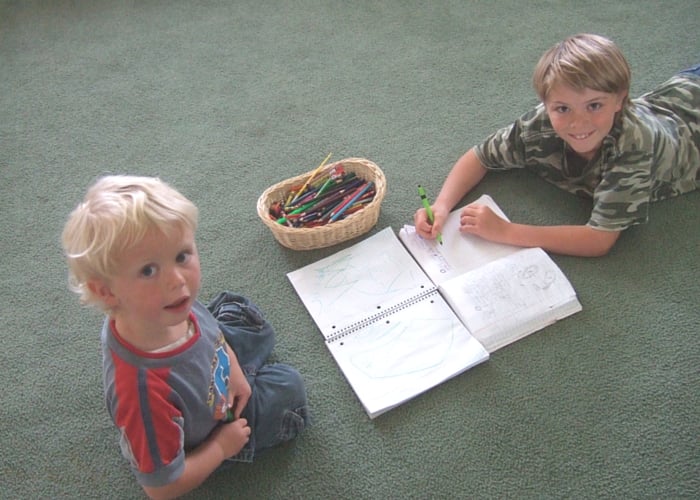When freewriting isn’t fun
Not everyone likes freewriting. Some kids feel pressured by the timer, they worry about making mistakes (even after being told that they can make all the mistakes they want!), they resist the idea of writing about any random topic. Others just don’t like writing and freewriting feels like one more writing task no matter how many times they are told that this is an easier form of writing than the one they are used to.
Our oldest son (Noah) told me that while he can write (and I’d say he writes well!), and while he certainly does know how to freewrite (and has done plenty of it), writing has never gotten easier for him. When he faces a blank page, he still fights the sensation of momentary panic and inertia.
And yet, I still firmly believe that every person can learn to write so that they are competent as adult writers. Even if they have that initial surge of panic when staring at a blank page, they will have cultivated some strategies for tackling the topic anyway!
Freewriting gives writers a chance to get the swirl of words inside, out of their heads and bodies and onto a page or computer screen. Those words, once out and visible, can be honed, revised, enhanced and massaged into better prose or exposition. Freewriting helps to untangle the jumble or to at least put the writer in touch with what there is to say (or not) about a topic.
Part of the charm of freewriting (its lack of structure, its freedom, its open-endedness) sometimes causes a surprising counter-reaction in some kids. These young writers feel too much freedom! They want guidelines, structure, clarity about the expectations. They want to avoid making a mess that will be required to go through a revision process later. So let’s look at how to help them over the hump with some novel ways to make freewriting less “free” while retaining the essential messiness that is most beneficial in terms of real writing later.
TOPICS
Some kids really do need a subject to get them going. Asking them to simply “write” whatever is on their mind is too big. Their minds are busy places and they can’t narrow the swirl of ideas down into a manageable size for writing. To help these kids, we suggest the “freewrite list.” One week, instead of freewriting, ask your kids to write a list of all the things they love and know lots about. This list can be written straight down the page and can include things like: soccer, horses, Harry Potter, how to make cookies, quilting, pet ferrets, hacky sacks, Starcraft, decorating Christmas trees, blow drying hair, WWII tanks, Star Wars, American Girl doll outfits and planting bulbs. There are no right topics. Only those your kids love and know well. Once you have a list, each week let your child pick a topic from the list to write about.
TOO MUCH TIME
Some kids do better with a few more boundaries around the freewrite. Rather than a 7-10 minute period, limit the time frame to 2-3 minutes. Ask your child to write as quickly as possible, without stopping, putting anything that comes to mind onto the paper. Keep the sessions short and don’t worry at all about content. The idea here is to just keep the pencil moving for 2-3 minutes.
PERFECTIONISM
Some kids are haunted by a need to know how to spell, how to punctuate, when to capitalize and so on. To be told that errors are permissible doesn’t ease the anxiety. Usually there are two reasons for this. The first is that the child is just one of those neat-nik kids who prefers order and hates a mess. For that child, simply tell him that if he doesn’t know how to spell a word, to call it out to you and you will instantly recite the proper spelling so he can continue without stopping. If this happens every third word, then you will need to let him know that he can make his mistakes but you promise to correct them with him as soon as he finishes.
The other kind of perfectionist is the one who knows that any mistake she makes will be required to be fixed by you. These kids are the ones who’ve figured out that if they don’t write perfectly the first time, they’ll have to revise and edit until you are satisfied with the product. First, reassure your child that this freewrite will not go through any revision. When it’s done, it’s done. Second, take a piece of scratch paper, crumple it up and then smooth it out again. Tell your child to freewrite on the crumpled page. Often, just seeing that the paper cannot possibly be used as a final copy will prevent the tendency to be overly careful with the freewrite.
HURTING HANDS
Some kids grip their pencils so tightly that when you add the pressure of a timer (and the instruction to write speedily), they cause themselves pain when they freewrite. No wonder they hate it! For these kids, you can try two options. For younger kids whose handwriting skills are still developing, offer to type their freewrites while they narrate orally to you. For older kids, let them freewrite on the computer from time to time until they learn to relax their hands.
NATURAL WRITING RESISTANCE
Some kids are naturally less verbal than others. They fight to find the words they need in their oral communication and find writing that much more of a challenge. Freewriting is an invitation to pain, for these kids! It’s like they have to openly admit that words don’t come easily to them. It’s not that they can’t speak, but they find themselves moving at a slower verbal pace than the chatty-Cathy’s around them. For kids like this, sometimes a timer feels like pressure rather than release. I suggest instead of timing these kids, ask them to keep writing until they are tired. That may mean they write one sentence and that’s all they can muster. Encourage these kids especially to write about that frustration as it comes up. They can write things like:
- I love playing lacrosse with the junior high team but i hate it when I don’t get to play attack. I’m so mad that I have to write. This is hard. My hand is cramping. I want to play attack.
Like that. They need to be helped to really express what is in the way of the words. These kids tend not to give language to their frustration or their physical sensations. So you can draw them out with questions, etc.




















